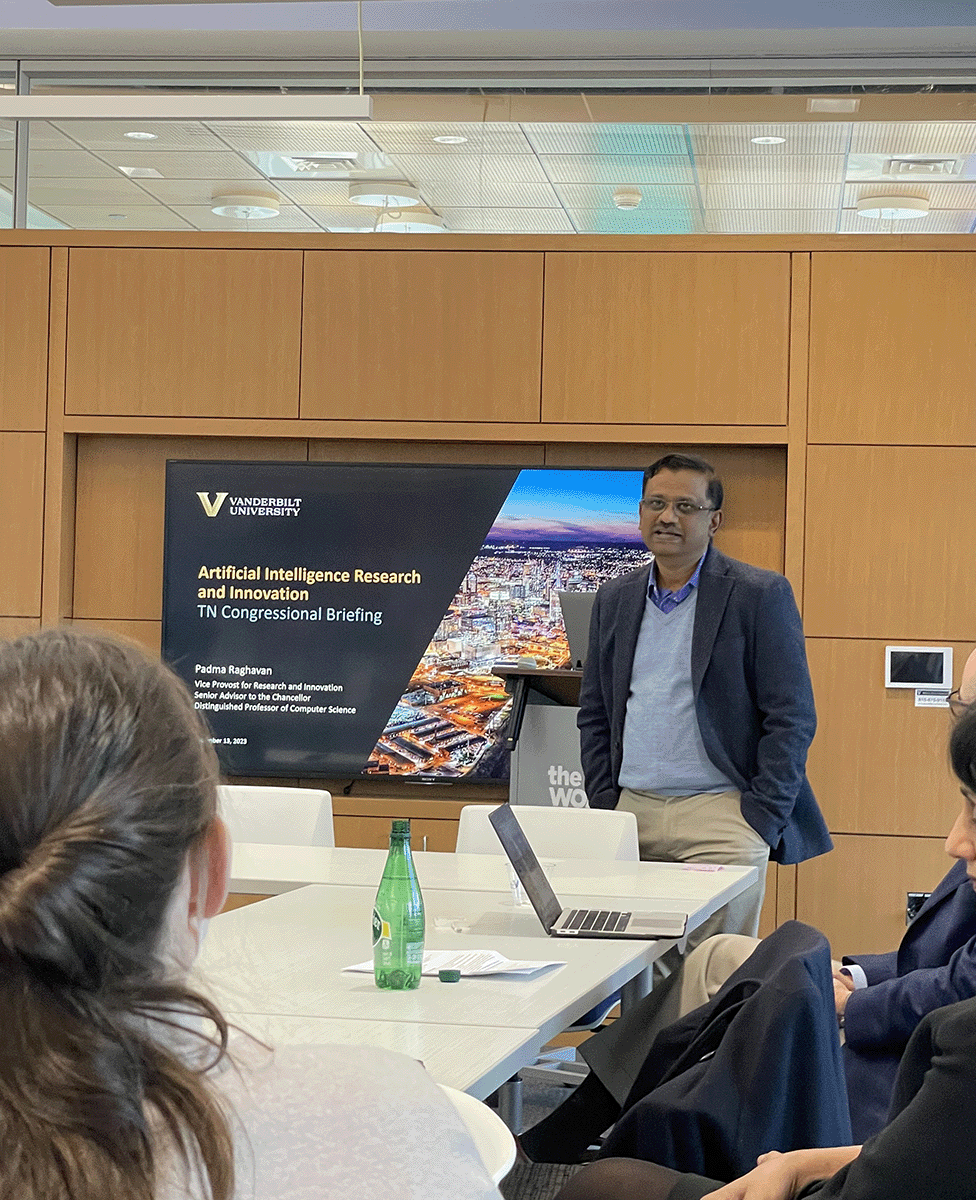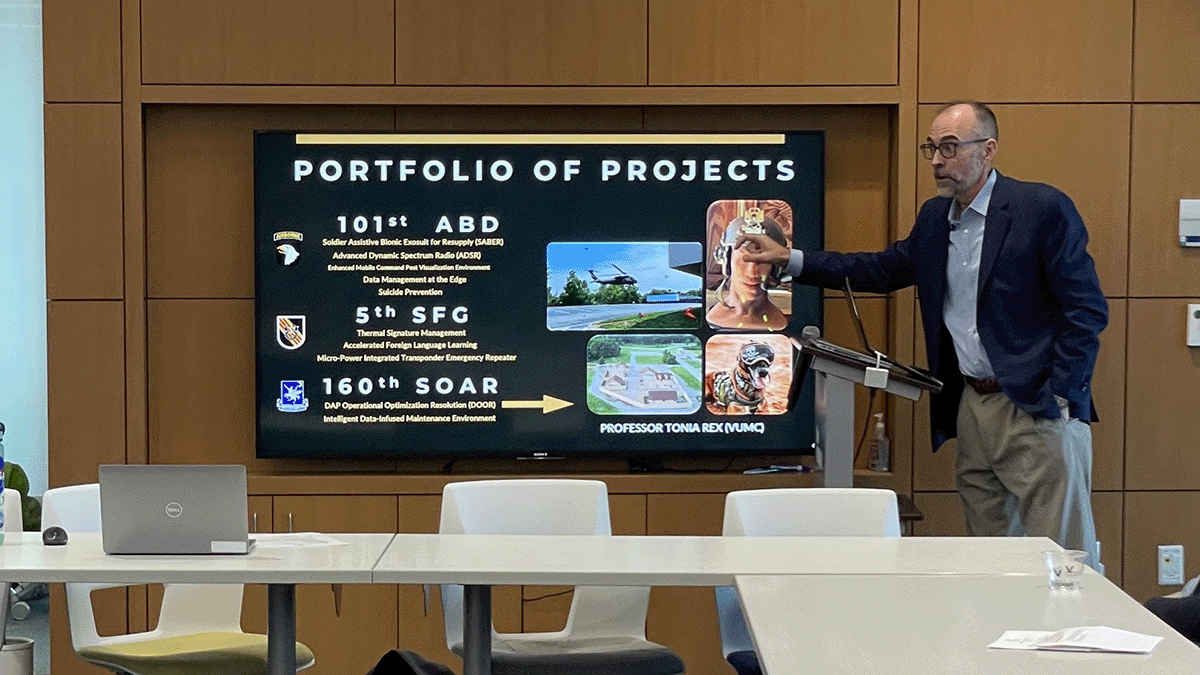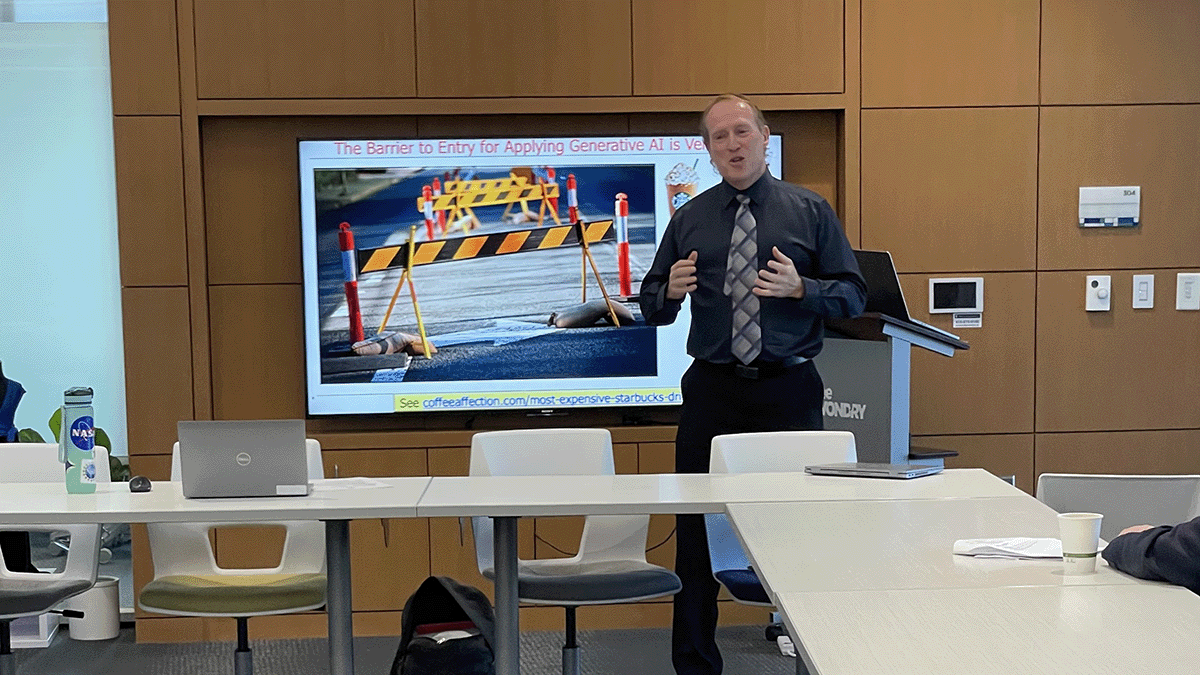The Office of Federal Relations hosted Tennessee-based congressional staff from the offices of Sen. Marsha Blackburn, Sen. Bill Hagerty, BA’81, JD’84, Rep. Chuck Fleischmann, Rep. Andy Ogles, Rep. John Rose, JD'93, Rep. Mark Green and Rep. David Kustoff on campus for a briefing on artificial intelligence research at Vanderbilt University. At this event, leaders and experts from Vanderbilt showcased the university’s pioneering work in the field.
“We were excited to bring congressional staff to campus to illustrate Vanderbilt’s cutting-edge AI research with the experts at the forefront of the field,” said Associate Director of Federal Relations Heather Bloemhard. "Vanderbilt is proud to share our expertise and discuss how it can support the work of our congressional offices.”

The event showcased interdisciplinary projects from across Vanderbilt’s research portfolio. Krish Roy, Bruce and Bridgitt Evans dean of engineering; John McLean, dean of graduate education and research, College of Arts & Science; and Padma Raghavan, vice provost for research and innovation shared how Vanderbilt is leading AI research in the key areas of defense, health, mobility, education and policy. They described how the university is enabling AI advancement through groundbreaking research, world-class centers and institutes, private sector partnerships, entrepreneurship and innovation programs, catalyst funding and redesigned curricula.
In her presentation, Raghavan shared that Vanderbilt’s goals for building the innovation ecosystem for AI is to accelerate discovery and innovation, power the economy, secure the nation, connect communities, and inform policy. She emphasized the importance of federal funding in the foundational research for these opportunities.
Ganesh Sitaraman, the New York Alumni Chancellor’s Chair in Law and director of the Vanderbilt Policy Accelerator for Political Economy and Regulation, provided valuable insights into VPA’s AI governance research that discusses the ethical considerations and policy frameworks that should accompany the rapid advancement of AI technologies. He shared how VPA is considering the enabling technologies for AI–from data storage to computing power–and how government agencies could approach regulation.

Doug Adams, vice dean of engineering, discussed the challenges related to AI and national security and how Vanderbilt addresses these issues through critical interdisciplinary research breakthroughs, especially with the support of the Pathfinder project. He argued that through these research projects, AI is empowering workers by unburdening them, not replacing them. He also noted the importance of an interdisciplinary approach to navigating AI in research and innovation opportunities. With the latest generation of AI tools being large language models, Vanderbilt is leveraging experts in the humanities to provide valuable insights.

Douglas Schmidt, associate provost for research development and technologies, described how disruptive technologies like AI are pivotal in human history, with inventions like the printing press transforming how we interact with each other. He argued that novel AI tools level the playing field due to the barrier to entry for applying AI being low.
He recommended that users should adjust their expectations for tools like ChatGPT; the criteria should be utility, not perfection. He compared AI to an exoskeleton for the brain because these tools can reduce cognitive load, make workers more effective and remove impediments.
Jules White, senior advisor to the chancellor for generative AI, demonstrated the practical applications of generative AI and highlighted its potential impact on enterprise solutions with ChatGPT. Building off of the presentations by Adams and Schmidt, he agreed that generative AI represents a quantum leap in technology.
White demonstrated through using ChatGPT that the best way to use these tools is to build on conversations with the model to refine the output. He showed how these models are adaptable and can tailor responses to various audiences based on the prompt. He also demonstrated practical ways to use ChatGPT while avoiding hallucinations using Vanderbilt’s travel policy as an example. According to White, users can get the most accurate response by giving ChatGPT the information they want it to reason about. He described additional real-world examples of how this can save time and reduce burdens, like summarizing the text of a long bill.
The event provided the congressional staff with a foundational understanding of generative AI models and the innovative research at the university. Vanderbilt's experts not only showcased a depth and breadth of AI expertise but also positioned Vanderbilt as a valuable resource for any future AI-related discussions.